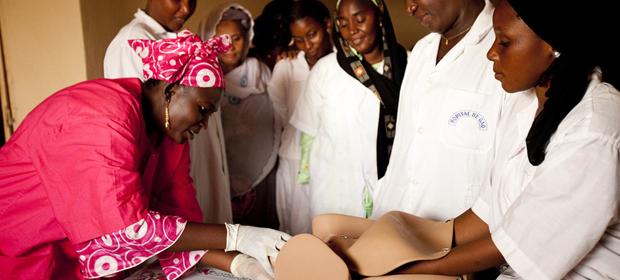Where We Work
See our interactive map


It takes two days to drive from Mali’s capital, Bamako, to the Gao Region in the north. Encompassing 66,000 square miles, Gao is larger than Greece, Tunisia, or the state of Florida. The one regional hospital serves a population of more than half a million people, including 269 nomadic groups. In rural areas like Gao, many women still give birth at home: only 38% of births in rural areas have a skilled attendant at delivery compared to 80% in Mali’s urban areas.1 Giving birth without skilled assistance and far from a health center puts these women at risk of serious complications including obstetric fistula. In an effort to meet these communities’ health care needs, IntraHealth International and its partners are collaborating with Gao Nursing School, Gao Regional Hospital, and the Ministry of Health to train health workers to offer basic reproductive health care and provide surgical repair for obstetric fistula.
So far, nearly 700 graduates of Gao Nursing School have gone to work for the Ministry of Health as nurses, midwives, and lab technicians. Remarkably, 95% of them work in health centers located in the north, offering much-needed services in family planning and reproductive health.
Gao Nursing School is also training students to help prevent obstetric fistula. Each year, there are an estimated 600 new cases in Mali. Recently, the school introduced a curriculum training module on fistula prevention. Gao Regional Hospital’s ob-gyn and midwives are the trainers and preceptors of this curriculum, and the hospital is one of the main practice centers for the students. The school is also implementing a strategic plan and working to improve its reproductive and child health curricula, with support from IntraHealth’s global project CapacityPlus.
Before 2008, no fistula care was available in Gao. For the past three years, Gao Regional Hospital has been building its capacity to offer women fistula repair surgeries with the support of the Mali Fistula Care Project. One of the project’s key approaches is providing on-the-job training for surgeons, which is more cost-effective than off-site training. The one national trainer in fistula prevention and surgery participates in two-week campaigns that offer women surgery at the hospital through the Mali Fistula Care Project.
“The national trainer conducts these two-week repair campaigns that are also used as on-the-job training for fistula surgeons,” says Laura K. Hurley, IntraHealth’s senior program manager. “We also train nurses in assisting the doctors through the surgery and providing counseling and care before and after surgery.”
Three surgeons have been trained in fistula repair, and more than 100 doctors, midwives, and nurses have received training in fistula care and counseling. More than 160 women have benefited from fistula repair since 2008. The on-the-job training approach has been integrated into the National Strategy for Obstetric Fistula Management by the Ministry of Health.
To learn more about how these programs are changing women’s lives, read Agaicha’s Story on our blog.
“Today, I am 20 years old. My father is the head of our village, and I am his 13th daughter. When I was 15, my father arranged my marriage with the head of our neighbor village. Soon after I married, I was pregnant. When I went into labor, it was very difficult. I spent five days laboring in the hands of the village women, battling for my life and battling to give birth. But I could not. On the sixth day, my uncle took me from the village to the nearest health center, 65 km away. Once we got there, an unskilled health provider pulled the baby out by force. My son was dead. The following day, my torment started: I could not control my bladder anymore.” »Read more
Reaching women, like Agaicha, who need this service is key. "I think one of the most exciting things we’re doing is getting the word out about fistula,” says Hurley, “and telling people what this is caused by—prolonged labor and early marriage, women having children before they’re really developed.” She adds, “The national trainer gets very excited about preventing early marriage and trying to enforce the national law that you have to be 18 to be married, and that is empowering for women.”
1. Demographic and Health Survey 2006. Cited in UNICEF 2010. Maternal, newborn & child survival: Mali country profile.
In Mali, IntraHealth is working with local partners to strengthen national health systems and increase access to services for maternal, newborn, and child health; family planning and reproductive health; and malaria. IntraHealth leads the CapacityPlus project and is a partner to EngenderHealth on the Mali Fistula Care Project, both of which are USAID-funded. IntraHealth’s other current projects in Mali are Keneya Ciwara II and ATN Plus.



